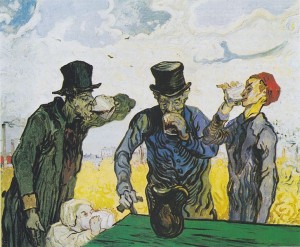Health advice used to be like cheap ball caps: one size fit all. Over the years, it has become more discriminating, with guidance that differentiates between ages, genders, ethnicity and more. And in the decades ahead, we’ll be making even finer cuts. Your doctor will run a DNA scan and tell you to eat more broccoli, take a calcium supplement and steer away from hard candy. (Actually, most doctors would tell you that today, but in the future they’ll have an even better rationale.)
According an article in the Mail Online, the U.K.’s Royal College of Psychiatrists has suggested that age-specific guidance be incorporated into the country’s recommendations on alcohol consumption. Citing the risks to pensioners (which seems like a quaint turn of phrase in the United Sates, where roughly half the population has no retirement savings or support outside of Social Security) of falling, depression and dementia, the shrinks now recommend that older men consume only 11 units of alcohol per week and older women limit themselves to seven units. A unit is defined as about eight ounces of beer or 4.25 ounces of wine. In U.S. terms, that means an older man would limit himself to fewer than eight 12-ounce bottles a week and an older woman would cut herself off at six five-ounce glasses of wine. Or, in certain crowds, three-and-a-half tumblers.
However, and here’s the controversy, in recent testimony before a committee of MPs, the Royal College of Physicians (not to be confused with the Royal College of Psychiatrists) set the limits at roughly twice that amount, while noting but not endorsing the other suggestions by the other college. Which seems like saying, we know they said…but here’s our opinion.
We like the recognition that olds react differently to many substances, and so our dosages should be different. But we’re not so sure about the reasoning. We get that anyone drinking too much can fall, and old people fall harder and get hurt more by a bad fall, so that seems like a reasonable argument for limiting consumption. The depression link seems plausible, but we’re not sure that a modest reduction in a modest consumption of booze units would have a meaningful impact on a mental illness. Yes, heavy alcohol consumption can lead to depression (although some argue that depression can lead to alcoholism, so it’s hard to tell what causes what).
What’s even less clear is the link to dementia, especially following a report last spring and another last summer that linked moderate alcohol consumption to a reduction in dementia and cognitive damage. The first report, which looked at Germans aged 75 and older, found that “those who drank two to three drinks a day decreased their risk of dementia by as much as 60 percent compared to those who abstained.”
And there seem to be other health benefits from moderate alcohol consumption. You can look it up. So—and this is where the issue is complicated—do you forego those benefits to reduce your risk of falling (and maybe depression)?
In other interesting British doctor news, the Royal College of Physicians is also claiming that current national guidelines are “extremely dangerous” and should be rewritten, because they condone daily consumption. Research shows the liver benefits from a rest now and then, even if you’re only a moderate drinker. That’s news to us, and we won’t argue with the numbers. So, herbal tea tonight (which means extra units tomorrow).
In a companion article to its coverage of the recommendations, the Mail asks “forensic experts” to doctor photos of a model to show what two glasses of wine a day would do to her face over ten years. Ha. It wouldn’t make a very interesting article if the wine didn’t mess her up, so you can see where this is going. We’d find this more revealing if they also asked their experts to dummy up a portrait of what ten years would do the model’s face over ten years. Then we’d compare. And probably have another reason to have those two glasses.
Illustration: Van Gogh’s The Drinkers (after Daumier) via Wikimedia Commons










